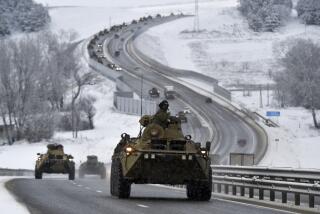The First Nonproliferation War?
- Share via
Economic sanctions have caused hardship among the Iraqi people but have failed to compel the leadership to comply with U.N. Security Council resolutions to eliminate Iraq’s nuclear, chemical and biological weapons. Saddam Hussein has also repudiated the diplomatic deal he negotiated in February with U.N. Secretary-General Kofi Annan. The sole remaining source of leverage is a military response. Of course, bombing is at best a blunt instrument, and even a protracted air campaign is unlikely to eradicate Iraq’s hidden weapons programs. But in assessing the desirability of military action, one should look at its broader strategic implications for efforts to halt and reverse the spread of weapons of mass destruction.
A fundamental weakness of the patchwork of treaties and agreements that make up the nonproliferation regime is the lack of mechanisms for enforcing compliance or punishing persistent violators. This failing was all too apparent during the Iran-Iraq War of 1980-88, when Iraq employed mustard and nerve gas against Iran in flagrant breach of the 1925 Geneva Protocol banning chemical warfare.
The international response was a deafening silence. At the time, the U.S. and its European allies declined to punish Iraq, allowing short-term foreign policy and economic interests to prevail over the moral imperative to enforce the ban on chemical warfare. Emboldened by the lack of international opprobrium, Saddam again resorted to chemical weapons in his 1988 terror campaign against the Kurds.
Columnist Flora Lewis sharply criticized “the complicity of the world community” and warned that tolerating Iraq’s illegal actions would encourage other states to acquire chemical and biological weapons. Unfortunately, Lewis’ prediction proved correct. These cruel and indiscriminate weapons have continued to spread throughout the Middle East, putting millions of innocent people at risk of a gruesome death if a major war were to break out between regional antagonists.
Thus an important and far-reaching rationale for military action against Iraq is to demonstrate that egregious violations of international norms will be punished. Outlaw states such as Iraq, which have not only acquired weapons of mass destruction but also used them in wars of aggression must be held accountable for their actions. If they are not, other countries will be encouraged to acquire these weapons in the belief that they will incur few costs in doing so, dangerously eroding the legal bulwark against proliferation.
It would obviously be highly desirable if the military response against Iraq were a broadly based international effort, underlining the fact that the spread of chemical and biological weapons poses a security threat to all nations. But if the United States and Britain are the only countries with the political will to defend the nonproliferation regime, so be it. The rest of the world community will have passed up a critical opportunity to enforce compliance with international law--by military means, if necessary.
More to Read
Sign up for Essential California
The most important California stories and recommendations in your inbox every morning.
You may occasionally receive promotional content from the Los Angeles Times.













